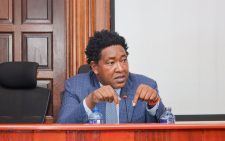Shifting trends in circumcision as a rite of passage

It’s that season again when boys are due for circumcision after completing their Kenya Certificate of Primary Education (KCPE) exams.
Of the many rites of passage that exist, circumcision is common. Traditionally, the practice entailed elaborate rituals that went on for days, drawing relatives and friends from far and wide
However, circumcision has undergone major transformation overtime as many people now reside in urban and semi-urban areas, hence opt to take their children to hospital to have the procedure done rather than stick to the traditional cultural practices.
And in the wake of Covid-19 pandemic, this event has greatly been affected, and everyone involved has to ensure that they adhere to safety measures to prevent spread of the virus.
Fred Kiiru, a counselling psychologist, author and life coach who also speaks to boys after they have undergone circumcision says due to Covid-19, the number of initiates attending training camps has been affected.
Also, the number of days the initiates stay at the camps has reduced from two weeks to seven days.
Safety first
“The Ministry of Health guidelines say only 30 initiates are supposed to be admitted in training camps, something that most churches have adhered to, especially in Nyeri and Mount Kenya region where I am based,” says Kiiru.
Maxmillah Nanjala, a mother of two, recently had her 11-year-old son undergo the procedure in hospital.
“I am glad that it went well. I preferred taking him to hospital. He was first checked if he had any Covid-19 related symptoms and was in mask until the time he was taken to theater,” says Nanjala.
“I had to look for a mentor who would guide and offer him words of advice as he transitions into an adult.
He now has a best friend who has walked the journey with him both emotionally, psychologically and socially.
When it comes to spiritually, our church pastor has been there and as a mother, I also try to offer him guidance,” she adds.
The healing process for her son was fast, with no infections. She offers: “ Years ago, I witnessed how a relative went through the traditional way in the village and ended up in a lot of pain and infections.
That’s why I opted for the hospital. I would have wanted him to be circumcised once he completes his Class Eight, but he had another medical condition and that’s why I decided that he undergoes both procedures early.
The doctor who performed the procedure also talked to him on how he should behave and conduct himself as an adult.”
Jacob Wamuswa, a father of two boys aged 14 and 12 says there are communities that still hold dear to their culture, especially the Bukusu.
And being in such an environment, one can easily be influenced to follow what the other generations did.
“I opted to take my son to the hospital. At that time, they were aged nine and seven.
Traditional circumcisers use one knife to cut all the boys in the entire village and beyond earmarked to undergo the practice. That is such a great risk and would expose many to infections,” says Wamuswa.
Karago Kabura says circumcision of boys amongst the Kikuyu community mostly occurs after the boy completes Class Eight, or when they attain the age of 13.
“Immediately our son completed his primary education, he only stayed for a week before his father and mentor began preparing him for the transition process.
He was 12 years old. He was enrolled into a programme conducted by the Presbyterian Church of East Africa (PCEA) in conjunction with a hospital within our area,” says Kabura.
Kabura says they preferred the hospital service due to the changing times in society. “It is good to go with the current times.
Considering the dangers of infections, we felt the hospital would be the most ideal place since hygiene and cleanliness of the tools of operation is keenly observed.
Also, considering that we live in an urban area where space is limited, the church-based setting becomes the best option because the boys board in the facility for one week where they are fed, nursed and taught how to be responsible as young men.
Circumcision of the body ought to accompany that of their mind. It even becomes better when the church works together with the hospital since the boys get to have a hygienic transition from boys into men and at the same time get spiritual nourishment during the time they stay in the facility,” she explains.
From boys to men
Kiiru says the modern parent is much informed, educated and exposed, which informs the decision for many of them to take their boys to hospital for the important cut.
Some churches have come up with programmes to help parents and the boys as they transition into the next stage of life, by taking them for two weeks training and preparing them to become men of character and substance in the society.
“This is the safe place to take boys to prevent them from being taught or exposed to vices such as drinking alcohol and cigarette smoking when they are taken to other unknown places, which are not formal,” he says.
“The boys are taught various lessons depending on the area and issues pertinent in the locality.
For instance, in an area where there have been a lot of boy/girl relationship issues, topics surrounding pre-marital sex and rampant drug abuse should be addressed to prepare the young men to handle such situations.
Some of the topics I have personally handled when I go to talk to these boys include social media and its influence, life in secondary school, drug and substance abuse, sexual purity, mental health, soft skills, character and discipline and virtues of a young man,” explains Kiiru.














